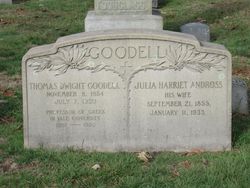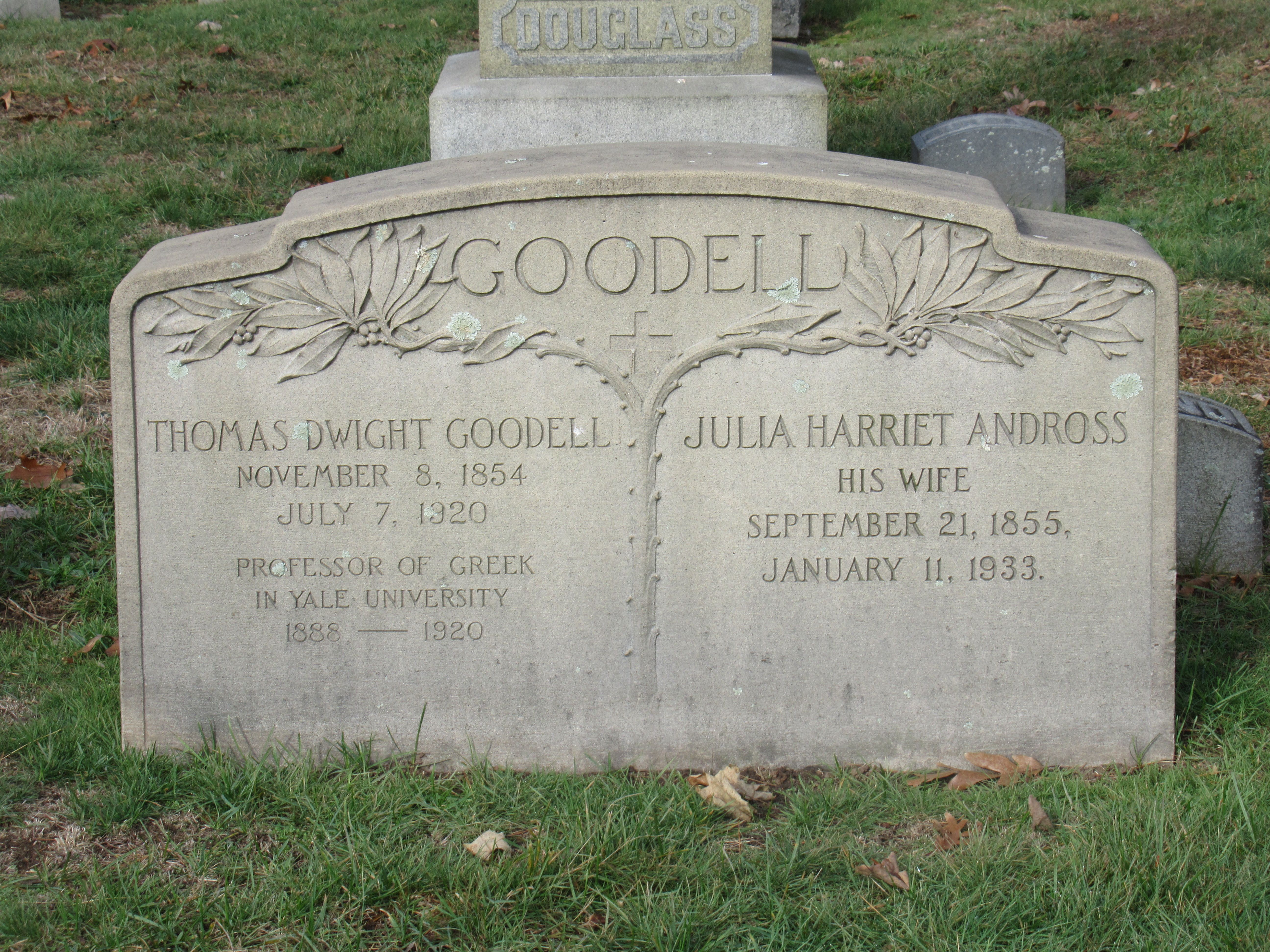Thomas Dwight Goodell was fitted for college at the Rockville (Conn.) High School. He was awarded the Hurlbut Scholarship in his Freshman year at Yale, received a third prize in English composition as a Sophomore, in his Junior year was given a first prize in the Winthrop competition and a second prize at the Junior Exhibition, and divided the Scott Prize, and in Senior year received a College Premium in English composition. His appointments were a philosophical oration in Junior year and a high oration at Commencement. He was a member of Phi Beta Kappa.
He had taught school in North Coventry and in Rockville before entering Yale, and upon graduation accepted a position as classical teacher in the grammar school section of the Hartford Public High School, where he remained for eleven years, carrying on at the same time extra work in the Yale Graduate School, for which he received the degree of Ph.D. in 1884. In 1886 he went abroad for fourteen months, matriculating at the University of Berlin and traveling in Greece and Italy. He was appointed assistant professor of Greek at Yale in 1888, and took up his work at the University in January, 1889. In 1893 he was promoted to a full professorship. He became senior professor of Greek in 1909, and since 1912 had been Lampson professor of the Greek language and literature.
He served as professor of the Greek language and literature at the American School of Classical Studies at Athens during 1894-1895, having been given a year's leave of absence by the University. He wrote the Greek Festival Hymn for the Yale Bicentennial Celebration, the music for which was composed by the late Horatio Parker, dean of the School of Music. Professor Goodell had published many books, among them being The Greek in English; First Lessons in Greek, with Special Reference to the Etymology of English Words of Greek Origin, 1886 (revised and enlarged, 1889); Greek Lessons, 1892; Chapters on Greek Metric, Yale Bicentennial Publications, 1901, A School Grammar of Attic Greek, 1902; Greek Lessons for Beginners (with Frederick S. Morrison, '80), 1903; and Athenian Tragedy: A Study in Popular Art, 1920. A volume of poems, entitled Commemoration, was published through the Yale University Press in June, 1921. Professor Goodell had contributed numerous articles and monographs to magazines and philological journals. He was a Congregationalist, and attended the College Church. He served as vice-president of the American Philological Association from 1909 to 1911 and as its president during 1911-1912, and was also a member of the Archæological Institute of America, the Connecticut Academy of Sciences, the Classical Association (British), and the Advisory Council of the Simplified Spelling Board.
He died at his home in New Haven, July 7, 1920, after a brief illness due to uræmia. Interment was in Evergreen Cemetery. Since his death Mrs. Goodell has given to the Archæological Museum of Phelps Hall a valuable group of Greek and Roman antiquities collected by Professor Goodell.
His marriage took place in Rockville, May 9, 1878, to Julia Harriet, daughter of William Wiltshire and Julia Ann (Stebbins) Andross. They had no children. In addition to his wife, Professor Goodell is survived by two brothers, one of whom is Edwin B. Goodell (B.A. 1877, LL.B. 1880), and two sisters. Philip Goodell, '04, and Francis Goodell, '08, are nephews.
Yale University Obituary Record, No. 22, 1921, pp. 99-101.
Per Contributor #47092087:
Per his obit in the New York Herald, 8 Jul 1920, pg. 11, he was a faculty member of Yale University for 32 years, making assistant professor in 1888, full professor in 1893, and holding the Lampson chair of Greek language and literature since 1912.
Thomas Dwight Goodell was fitted for college at the Rockville (Conn.) High School. He was awarded the Hurlbut Scholarship in his Freshman year at Yale, received a third prize in English composition as a Sophomore, in his Junior year was given a first prize in the Winthrop competition and a second prize at the Junior Exhibition, and divided the Scott Prize, and in Senior year received a College Premium in English composition. His appointments were a philosophical oration in Junior year and a high oration at Commencement. He was a member of Phi Beta Kappa.
He had taught school in North Coventry and in Rockville before entering Yale, and upon graduation accepted a position as classical teacher in the grammar school section of the Hartford Public High School, where he remained for eleven years, carrying on at the same time extra work in the Yale Graduate School, for which he received the degree of Ph.D. in 1884. In 1886 he went abroad for fourteen months, matriculating at the University of Berlin and traveling in Greece and Italy. He was appointed assistant professor of Greek at Yale in 1888, and took up his work at the University in January, 1889. In 1893 he was promoted to a full professorship. He became senior professor of Greek in 1909, and since 1912 had been Lampson professor of the Greek language and literature.
He served as professor of the Greek language and literature at the American School of Classical Studies at Athens during 1894-1895, having been given a year's leave of absence by the University. He wrote the Greek Festival Hymn for the Yale Bicentennial Celebration, the music for which was composed by the late Horatio Parker, dean of the School of Music. Professor Goodell had published many books, among them being The Greek in English; First Lessons in Greek, with Special Reference to the Etymology of English Words of Greek Origin, 1886 (revised and enlarged, 1889); Greek Lessons, 1892; Chapters on Greek Metric, Yale Bicentennial Publications, 1901, A School Grammar of Attic Greek, 1902; Greek Lessons for Beginners (with Frederick S. Morrison, '80), 1903; and Athenian Tragedy: A Study in Popular Art, 1920. A volume of poems, entitled Commemoration, was published through the Yale University Press in June, 1921. Professor Goodell had contributed numerous articles and monographs to magazines and philological journals. He was a Congregationalist, and attended the College Church. He served as vice-president of the American Philological Association from 1909 to 1911 and as its president during 1911-1912, and was also a member of the Archæological Institute of America, the Connecticut Academy of Sciences, the Classical Association (British), and the Advisory Council of the Simplified Spelling Board.
He died at his home in New Haven, July 7, 1920, after a brief illness due to uræmia. Interment was in Evergreen Cemetery. Since his death Mrs. Goodell has given to the Archæological Museum of Phelps Hall a valuable group of Greek and Roman antiquities collected by Professor Goodell.
His marriage took place in Rockville, May 9, 1878, to Julia Harriet, daughter of William Wiltshire and Julia Ann (Stebbins) Andross. They had no children. In addition to his wife, Professor Goodell is survived by two brothers, one of whom is Edwin B. Goodell (B.A. 1877, LL.B. 1880), and two sisters. Philip Goodell, '04, and Francis Goodell, '08, are nephews.
Yale University Obituary Record, No. 22, 1921, pp. 99-101.
Per Contributor #47092087:
Per his obit in the New York Herald, 8 Jul 1920, pg. 11, he was a faculty member of Yale University for 32 years, making assistant professor in 1888, full professor in 1893, and holding the Lampson chair of Greek language and literature since 1912.
Family Members
Sponsored by Ancestry
Advertisement
Advertisement






